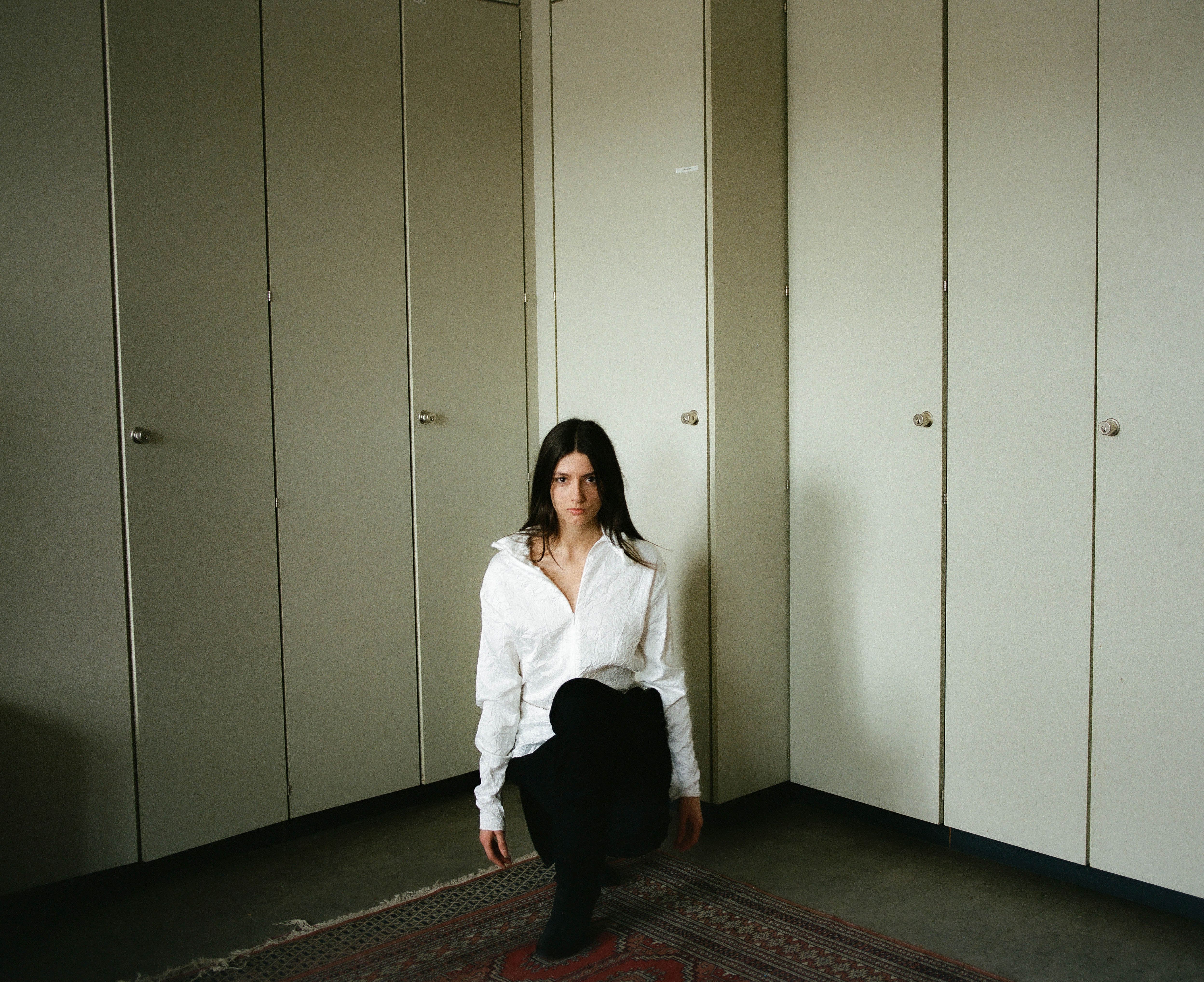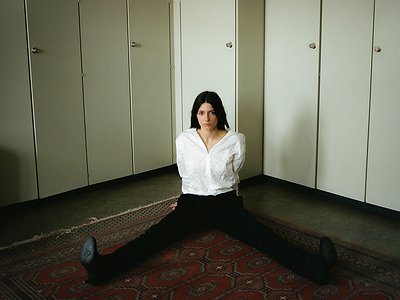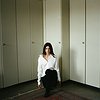Name: Milena Mayordomo aka MILYMA
Nationality: Spanish, Germany-born, Switzerland-based
Occupation: Singer, songwriter, producer
Current release: MILYMA 's Only Lovers Left A Lie is out now.
Recommendations: Paintings by Issy Wood, which I recently discovered in Paris. And I love how surprising Andre 3000's latest album was, who doesn't?
If you enjoyed this MILYMA interview and would like to keep up to date with her music, visit her on Instagram, Soundcloud, and bandcamp. She also has a personal homepage.
When I listen to music, I see shapes, objects and colours. What happens in your body when you're listening? Do you listen with your eyes open or closed?
In my case it evokes different feelings and thoughts – so it really depends on how I feel at that moment and how my state of mind is.
I usually listen to music with open eyes but when I want to consciously listen, I close them.
Entering new worlds and escapism through music have always exerted a very strong pull on me. What do you think you are drawn to most when it comes to listening to and creating music?
I think I'm most drawn to harmonies, but also to authenticity, personality, and honesty in music. And I think those are the same expressions that are important to me when I make music.
I've learned to open up and be very vulnerable when making music.
What were your very first steps in music like and how would you rate the gains made through experience?
It's difficult to evaluate them since many steps were important. From the age of 9 to 19, I played classical piano. I think classical music has influenced me – how I make and listen to music.
Then, at the age of 13, I started dancing, which was very impactful in perceiving music differently. I was then in an intense Hip-Hop phase.
And with 18, I bought my first synthesizer, which started my whole ,learning by doing' process.
According to scientific studies, we make our deepest and most incisive musical experiences between the ages of 13-16. What did music mean to you at that age and what’s changed since then?
As I mentioned, I delved deeply into hip-hop music and dance at that time, spending days just finding new music to dance to.
What has changed since then, probably simply not finding as much time and exploring other interests in music or different genres.
How would you describe your own relationship with your instrument, tools or equipment?
I value my equipment a lot, also because I haven't been able to buy new things for a while now. So I try to get the most out of what I have.
I love my real piano; it feels good to sit down at something analog without staring at a screen.
Where does the impulse to create something come from for you? What role do often-quoted sources of inspiration like dreams, other forms of art, personal relationships, politics etc play?
I think the impulse itself is the necessity to make music. And where the impulse comes from, is the unconscious.
The sources of inspiration play various roles and are differently present. Sometimes it's a relationship that moves me in this moment – sometimes it's world affairs which occupy me.
Are you acting out parts of your personality in your music which you couldn't or wouldn't in your daily life? If so, which are these? What, would you say, are the key ideas behind your approach to music?
Yes, I believe music is a conduit for things we cannot define. Some things I can only express through that - whether it's standing on stage with my music, presenting myself and defining myself how I want – having control over my narrative.
Regarding key ideas - I make music very intuitively and rarely go into the studio with specific ideas. One goal I want to pursue is to embrace all aspects of myself - including my insecurities and just be honest with what I create.
If music is a language, what can we communicate with it? How do you deal with misunderstandings?
I think we would have the same misunderstandings as we do with spoken language. Music is a language; we communicate through it, whether it's through movement, dancing together, expression, gesture, or by playing music together (and more).
But music is also very personally interpreted, so it's probably difficult to define a holistic understanding.
Making music, in the beginning, is often playful and about discovery. How do you retain a sense of playfulness and how do you still draw surprises from tools, approaches and musical forms you may be very familiar with?
Playfulness is something you still have or not if you haven't been socialized to unlearn it. We are often socialized to view childishness in adulthood as something negative. However, I find it fascinating how children want to learn and show enthusiasm for new things.
When I’m in the studio I let the music and sounds lead me, and from there, I build. With the technical knowledge, my equipment and vocals, I can then develop certain structures into the songs.
In my music-making creation is playful and uncontrolled and construction is technical.
MILYMA Interview Image by Aysan Lamby
Sound, song, and rhythm are all around us, from animal noises to the waves of the ocean. What, if any, are some of the most moving experiences you've had with these non-human-made sounds? In how far would you describe them as “musical”?
For me, everyday 'natural' sounds are very moving – once you live in a city (which has always been the case for me), the rustling of trees or singing birds can already be very grounding.
I wouldn't call everything musical, but most things that have either harmony or rhythm, yes. However, I like to incorporate various recordings I make when I’m moving outside, into my music to achieve that feeling of intimacy.
There seems to be an increasing trend to capture music in algorithms, and data. But already at the time of Plato, arithmetic, geometry, and music were considered closely connected. How do you see that connection yourself? What aspects of music do you feel can be captured through numbers, and which can not?
While certain elements of music can be effectively captured and analyzed using mathematical concepts, the richness of musical experience goes beyond what can be expressed through numbers.
The emotional and subjective dimensions of music, as well as cultural and historical contexts, define the uniqueness and diversity of musical expression, making it complex and multifaceted.
How does the way you make music reflect the way you live your life? Can we learn lessons about life by understanding music on a deeper level?
I mean, most of my time I spend working on music - so the reflection is how I live. A deeper understanding of music allows me to better understand, express, and deal with my emotions.
Music is a creative process that often challenges the boundaries of traditional thought patterns. Music as a creative process helped me enhance my ability for creative problem-solving. It also means unity and community as example: sharing music experiences and activities. Being a musician often requires discipline and a lot of patience.
All these things I try to transfer to other areas of my life or are already a part of me.
We can surround us with sound every second of the day. The great pianist Glenn Gould even considered this the ultimate delight. How do you see that yourself and what importance does silence hold?
I perceive silence as healing and regenerative. It allows me to calm down and contributes to stress relief and my well-being.
Through silence, there can be more space for mindfulness and self-reflection. Without distractions, I can (sometimes) perceive my thoughts and feelings better. It can be a good impulse for my creativity and inspiration for new ideas to rise.
Do you feel as though writing or performing a piece of music is inherently different from something like making a great cup of coffee? What do you express through music that you couldn't or wouldn't in more 'mundane' tasks?
Yes, music is emotional and artistic, and there are probably infinitely many ways to perform or express it.
For 'mundane' tasks, this is usually not the case or there is no interest in making them complex but rather doing them in a practical and logical way.
If you could make a wish for the future – what are developments in music you would like to see and hear?
A more diverse – in the sense that more creative, honest, personal, unique, and bizarre music would receive more attention. That's what I would wish for; a range of more diverse artists.





